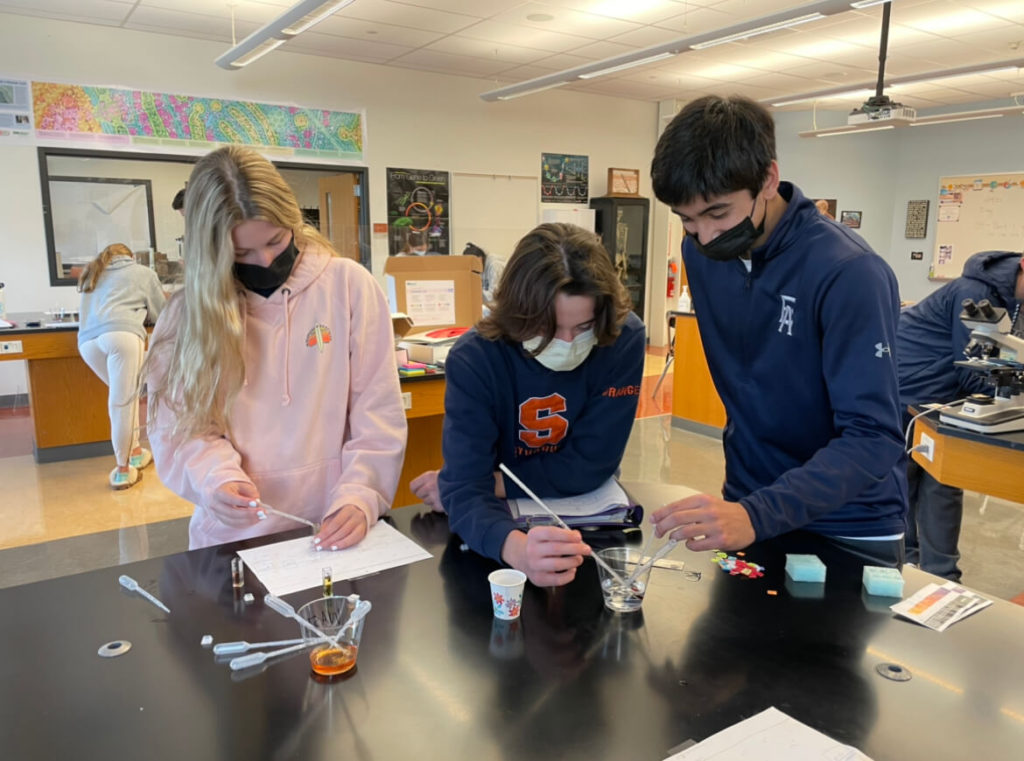Henry Kovan ‘23
The new science curriculum at EA has allowed for greater variety in course selection in recent years. One of these new changes is the ability of sophomores to take A.P. science courses. Previously, students would follow a very specific, set track: freshmen would take biology, sophomores would take chemistry, and juniors would take physics. If they wanted to take science, seniors, having already satisfied the science requirement, could take whatever science courses they had not completed or were interested in.

Photo Courtesy of Ashley Kennedy ’22
Starting last year with the class of 2024, students have a much more flexible path to their sciences, and are not subject to the finite track that their older peers have been on since they were freshmen. Grace Limaye ‘90 and Head of the Upper School Science Department, explained how this new structure to the science curriculum works, saying, “In an effort to offer more flexibility, choice, acceleration, and inclusivity in the Upper School science curriculum the Science Department took the existing three mandatory years of lab science [biology, chemistry and physics] and broke them into semester courses [Bio 1 / Bio 2, Chem 1 / Chem 2, Physics 1 / Physics 2].
Limaye also clarifies why the semester-long environmental science course was added, explaining, “[We] added a new introductory semester of Environmental Science, EES 1. We feel strongly that students should be exposed to more environmental science and, accordingly, develop an intro level course.”
After taking Level 1 courses, students are expected to take Level 2 courses. However, Limaye explains that depending on a student’s performance in their introductory course and teacher recommendations, “the student may ‘skip’ the Level 2 course and take the AP Level course.
Despite the potential allowance to skip the sequential second semester science course, those who choose (and are approved) to do so make up a small number. Limaye notes, “We have about a dozen sophomores currently taking AP science courses this year in AP Bio, AP Chem and AP Environmental Science.”
Although students who accelerate their path by skipping Level 2 are undoubtedly strong in the discipline, smart and motivated, many sophomores taking these courses felt like it was a significant step up at the beginning of the year. Delaney Welsh ‘24, who is currently taking A.P. Chemistry, felt that there is “definitely more work in terms of homework assignments and labs” and that she “finds [herself] having to study more for tests since there is significantly more material.”
In addition to the increase in difficulty, sophomores were not helped by the fact that many of the level 1 courses did not get through all their content due to a combination of being a one-semester course and the reduced class time caused by EA’s COVID schedule. George Lorenson, Upper School Honors II and AP Chemistry teacher, changed his syllabus slightly to allow for more review time due to missed content.
He explains the reasons behind the adaptation, stating, “If it wasn’t for COVID, I don’t think we would be in the same catch up mode as they [sophomores] had to be in earlier, but they missed a lot to catch up, so I reviewed more, and what was on the review, for them some of that was new material. We changed the course, but it wasn’t primarily as much because of Chem 1 as it was because of COVID, and losing all that class time.”
Like Lorenson, Jennifer Jones, AP Biology Teacher, has not changed her course but instead finds ways to supplement any gaps in the knowledge of sophomores and anyone who has missed content, hosting review sessions during domino. She says, “The only real difference is that I have had after-school meetings for anybody, but no real extra work. I’m super impressed with their work ethic. Also, there are a few kids who transferred to EA that do not feel that they have the same knowledge as kids who took the freshmen year bio curriculum, who attend these meetings as well.”
Sophomores in the classes have adjusted to the rigorous demands, according to Lorenson, who states, “[The sophomores are performing] equal to everyone else. They are doing great, and none of my sophomores are in concerning grade area, they are all doing really well, I can’t see any difference.”
Kate Lamb ‘24, enrolled in A.P. Environmental Science, felt similar to Welsh, saying that in the beginning, “the workload was a lot, but [she became] used to it after the first unit.”
As to the overall change to the curriculum, Lorenson concludes, “I think it’s great that we have given students more opportunity and the chance to try what they are interested in earlier, and if they really like a subject and they’ve demonstrated they are really good at it, we have a means now as a department for them to accelerate.”